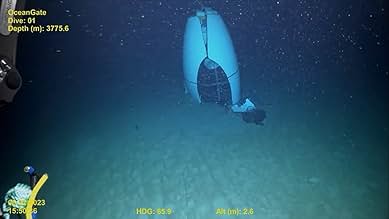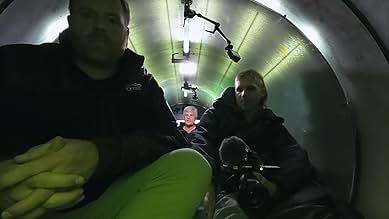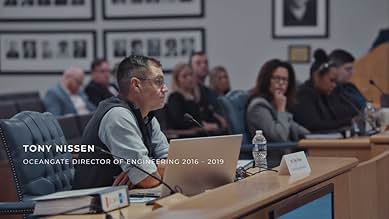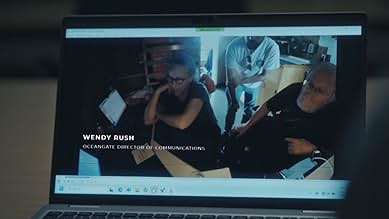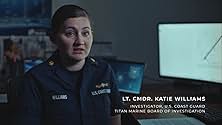
Füge eine Handlung in deiner Sprache hinzuIn June 2023, the OceanGate submersible imploded, killing all on board. Uncover the extraordinary story of what led to the disaster and its potential prevention, with exclusive access to the... Alles lesenIn June 2023, the OceanGate submersible imploded, killing all on board. Uncover the extraordinary story of what led to the disaster and its potential prevention, with exclusive access to the USCG investigation and never-before-seen video.In June 2023, the OceanGate submersible imploded, killing all on board. Uncover the extraordinary story of what led to the disaster and its potential prevention, with exclusive access to the USCG investigation and never-before-seen video.
- Narrator
- (Synchronisation)
- Self - Investigator U.S. Coast Guard Titan Marine Board of Investigation
- (as Lt. Kelly Steele)
- Self - Founder and CEO, OceanGate
- (Archivfilmmaterial)
- Self - Lead Investigator, U.S. Coast Guard Titan Marine Board of Investigation
- (as Lt. Cmdr. Tom Whalen)
- Self - Investigator, U.S. Coast Guard Titan Marine Board of Investigation
- (as Lt. Cmdr. Katie Williams)
- Self - OceanGate Director of Communications
- (Archivfilmmaterial)
Empfohlene Bewertungen
And who on earth was responsible for the on-screen effects? Every time they show a date they immediately rewind it 1, 2 or 3 years. Just show the date as it is, it's extremely annoying.
The bulk of this documentary focuses on portraying Stockton as a narcissist who ignores all warnings and safety, to parallel the USCG's investigation that inevitably will draw the same conclusion. The interviews don't seem like they're acknowledging the whole truth, or are leaving out certain details. There seems more to the story that we are not being told. Ultimately Stockton may be responsible, but one man was not able to design, build, and operate a submersible sub without the assistance of at least a hundred other people over the last decade. The documentary also leaves out that OceanGate operated other submersibles.
This documentary is 90 minutes of "Stockton bad", instead of 90 minutes of telling the story beyond Stockton, which is what a lot of people wanted.
I harbored no expectations to this particular documentary, as I had in effect put the memories of this event so far away in memory that I no longer thought about it. Only by stumbling upon the documentary did my mind get reminded about the implosion and the tragedy. And of course I have my own opinions of Stockton and OceanGate.
Writer Gary Lang and director Pamela Gordon put together an insightful documentary that delt with the matter of the implosion in, what I believe to be, a neutral and objective manner. The documentary did put a lot of things out in the open that I was not aware of. But then again, I didn't really closely follow the incident back when it was on the news. I only kept up with in peripherally.
Watchable, sure. Informational, sure. The 90 minutes of this documentary were actually well-spent. Not something you watch more than once, though.
My rating of "Implosion: The Titanic Sub Disaster" lands on a six out of ten stars.
Maybe not so much now after watching this chilling one-hour BBC documentary on US entrepreuner and inventor Stockton Rush's ambition to build a carbon-fibre submersible capable of exploring the depths of the oceans. His OceanGate company was set up to take anyone willing and able to cough up the $250000 to take the trip down to see at first hand the wreck of the legendary Titanic where it sank in 1912, two and a half miles below the Atlantic Ocean.
As we now know, Dive no. 88 ended tragically when the Titan vessel imploded near the bottom of the ocean instantly killing its five passengers, including Rush himself and a British father and his young son. In a programme filled with interviews, that with the wife and mother of the latter goes hardest, as she just about manages to balance her anger at Rush with her deep sorrow for her loss.
There's an ongoing official US Coastguard enquiry into the disaster, so that this mini-documentary, which has access to some of the actual witness testimony, somewhat pre-empts the outcome but I personally didn't get the impression that the events leading up to it were presented in a partial way. We get Rush's back-story, that of a clearly ambitious individual, born to wealth but determined to make his own way in the world. Like his family predecessors, it's unsurprising that he looked to bend the great seas to his will, although we do learn that his first interest was actually in space travel.
Finally, he completes the design of his prototype mini-sub but there are clear signs along the way that his checks weren't anywhere near as rigorous as such a dangerous enterprise demanded. Past colleagues and employees relate to camera and the official investigation their concerns, especially on the matter of the potentially calamitous lapidation of the carbon-fibre core, although some of these claims are disputed. The centrepiece of the programme is the actual footage of OceanGate's own video feed of the moment catastrophe struck, as we see Rush's wife reacting to the noise of the bang when the implosion occurred, heartbreakingly followed by a delayed message from the Titan vessel indicating things might be okay.
In the end this is a tale of one man's extreme hubris blinding him to his duty of care to the unfortunate individuals who put their trust in him. Yes, he too paid his own personal price in the process, but in actively marketing a place on his little ship as the "safest place on the planet", he was misguided in the extreme and inflicted lasting heartache on the surviving friends and family of those who sadly perished with him.
Wusstest du schon
- WissenswertesKarl Stanley, pilot for Titan/DeepGate, claimed the Titan's implosion caused temperatures 'hotter than the sun (within the vessel well as), extreme pressures ('twice those of a scuba tank '), However, the actual pressure is 5,600 psi, nearly 400 times atmospheric pressure. Stanley's statements are not only false but also misleading, which is concerning for a professional. While implosions do create some heat, the surrounding cold deep-sea water would significantly diminish it, making any heat generated negligible compared to solar temperatures.
- Zitate
Self - Host, Expedition Unknown, Discovery Channel: I suddenly realized, what would it mean if I made this kind of promotional documentary about Stockton and about OceanGate that maybe inspired other people to go and take a ride in this sub... and then something happened to it? And so I made the really difficult decision to call up the president of the network and to fall on my sword and say, "I'm really sorry, I know that money's been spent here, I know that this is something that was a big deal for you to sign off on, and I appreciate the opportunity, but we shouldn't do this. This is a mistake. Something bad is going to happen here."
- Alternative VersionenThe version released on Discovery, a day after the BBC' release is 30 minutes longer with scenes edited in a different order and with more archive footage, extended interviews, hearing testimony from Tony Nissen, and written onscreen narrative graphics instead of a narrator voice over.
Top-Auswahl
Details
- Laufzeit1 Stunde
- Farbe
- Sound-Mix
- Seitenverhältnis
- 16:9 HD
Zu dieser Seite beitragen


